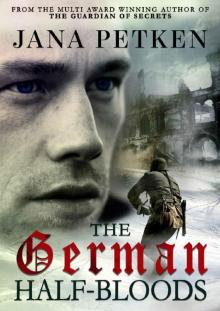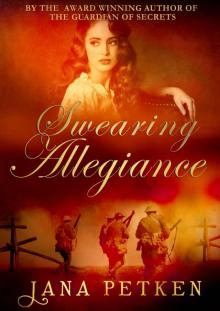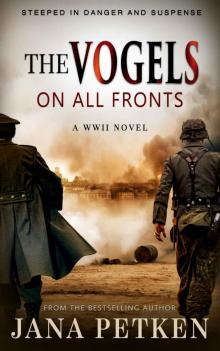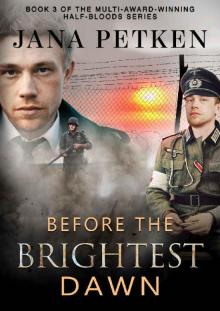- Home
- Jana Petken
Swearing Allegiance (The Carmody Saga Book 1) Page 19
Swearing Allegiance (The Carmody Saga Book 1) Read online
Page 19
“So, John, what did you and Jenny talk about?” he asked.
“Nothing much. She kept shutting her eyes.”
Danny tried again. “I understand how upsetting this must be for you. I can’t imagine anything worse than seeing the woman you love in pain and suffering terribly. But you have to be strong. She needs you.”
John kicked a stone and then let out a long sigh.
“She might be in that hospital for six months,” Danny continued, wondering what he had to say or do to get a reaction.
“Less than that,” Patrick corrected Danny. “Dr Thackery will probably let her go home in a couple of months. Her leg is healing nicely, and she’s not showing signs of infection. He’ll teach Mam about the medicines Jenny needs and about keeping the wounds and burns sterile. It’s a known fact that patients heal quicker when they’re in their own beds, being looked after by family.”
“You hear that, John? It’s not as bad as we thought. You know, I think I can get my mam to give you Jenny’s bedroom to sleep in until she comes home. We’ll get jobs and you can start planning for your future. Maybe you and she can get married in the hospital. Wouldn’t that be grand?” Danny ended his enthusiastic suggestions by embracing John and giving him a hearty pat on the back. “Ah, John, everything will be right as rain in no time.”
“No, it won’t.” John stared at Patrick and then turned his gaze on Danny. “No, it will not be all right,” he repeated. “Not now and not in the future. I have to get back to Ireland. I have a family too, you know.”
Shocked at John’s harsh tone, Danny said hesitantly, “I know that, but if you wait a wee while, you and Jenny can get settled, and then you can take her home with you, just as you planned.”
The three men stopped walking. John’s eyes bore into Danny. “I’m not staying in London. I hate England,” John said. “I thought you did too.”
Again taken aback by John’s aggression, Danny said, “Well, I admit that I don’t want to live here, but I can’t desert my family. I’m surprised you’re even thinking of leaving your fiancée … the way she is.”
Patrick, who had been silent up until now, said, “Maybe John should go back to Ireland to see his mam. He can always come back to see Jenny in a few weeks, when she’s feeling a bit better.”
“I’m not coming back here,” John said gruffly.
“What do you mean? Never?” Danny asked.
“I can’t. I can’t do this. I feel sorry for what’s happened to her – I do – but I won’t pretend or hide what I feel.”
“Oh, and what’s that?” A sense of foreboding tingled through Danny. John stared at the ground. Danny dreaded the looming altercation. He looked at Patrick, who was already clenching his fists in anger. Shite, John was going to throw Jenny over.
“Well, speak up, man. What exactly do you bloody feel?” Danny hissed.
“I feel trapped! I just can’t see myself marrying her, not now that she’s like that. Jesus, the thought of kissing that face – I couldn’t. It’s all too much for me. It’s finished between us.”
Stunned into silence, Danny could only stare at the man he’d called brother. “The thought of kissing that face,” John had said, shuddering with revulsion. The bloody cheek on him! He was talking about Jenny, the woman he’d courted for almost three years. The love he’d fight for, he’d stated only yesterday.
“Ya fuckin’ scum bastard! You made a promise to my sister.” Danny’s voice cracked with anger.
“Aw, come on now, Danny, don’t be like that. You know what’s got to be done in Ireland. I intend to rise up the ranks, and I can’t do it with a sick wife looking like burnt toast. You’d do the same as me if it were you. Don’t deny it.”
Patrick’s punch surprised Danny as much as it did John. Knocked off his feet, John lay on the ground moaning. Danny stood back. Patrick looked as though he had a lot to say, and he, Danny, wasn’t going to stop him.
Standing over John, who looked too afraid to stand up, Patrick said, “Make your own way to wherever it is you’re going. Go to hell for all I care; just don’t show your face in Greenwich.”
“My stuff is there,” John whimpered.
Danny sniggered, “What stuff? You’ve got nothing but an old pair of trousers that you were given at Frongoch, same as me. So do as Patrick says and bugger off!”
John eventually had the courage to stand. Facing the brothers, he looked contrite. “You know I’m sorry, don’t you, lads?”
Danny, the first to turn his back on John, shouted over his shoulder, “Your name will be mud when I get home to Dublin. Not a republican man or woman will respect you, or trust you, or even want you in the brotherhood. You mark my words!”
John looked pleadingly at Patrick. “You can’t leave me stranded in a strange city without a penny.”
“Can’t I?” Patrick said.
“Can you give me a few shillings for my journey home?” John asked with his hand out.
Danny was bitterly upset, and although he was too proud to admit it, his anger and disappointment in John was probably even greater than Jenny’s would be. Turning around, he walked back towards John, and before he’d even reached him, he threw back his arm, swung it, and punched him hard on the jaw.
John staggered backwards and then fell onto his backside. Danny and Patrick turned on their heels.
“That’s all you’re going to get from the Carmodys!” Danny shouted, walking away.
Part Two
War and Survival
Chapter Thirty
16 November 1916
Kevin ran breathless and bent over double with a stitch hammering his side. He could see the lip of the trench right in front of him. A few more yards and he’d be saved by its deep dirt walls.
He stumbled, fell, and lay face down in the thick muddy porridge of no man’s land. He’d literally bitten the dirt, he thought, tasting it assaulting his mouth. This could be it; the end of my life. Frozen, he waited for some respite in the shooting. What a stupid thing to do, he thought. Waiting for the firing to stop? It never stopped, ever! He wondered if he should just pretend to be dead. He then thought better of that idea; mortars and artillery could hit a dead man just as easily as a running, breathing one.
He lifted his face out of the mire to see men falling, blood spouting out of their bodies. Some had made it to the trench, jumping into it and disappearing from sight. Getting on his elbows, he slithered towards it, praying, begging to be saved, and when it was no more than ten feet from him, he got to his feet, took a run, and jumped.
A few minutes later, Kevin, seconded to the Fifth Army in the British Expeditionary Force on the Western Front, sat against the muddy wall of a redoubt sarcastically named Buckingham Palace. With his knees up at his chest, arms wrapped around his legs, and his head bowed, he felt every part of his body tremble. It was always like this. After surviving death, the shock of being alive and the terrifying thoughts of what might have been kicked in. It usually took some time before the traumatized body began to relax.
He was sick to his stomach at the sight of blood and death. Day after day, week after week, he had witnessed the annihilation of his fellow man, and somewhere in the midst of those battles, he had become both saviour and killer. There didn’t seem to be much distinction anymore, he thought, for one minute he was sewing up a stomach wound and trying to save a life and the next he was bayoneting a complete stranger, trying to take a life. Such was the way of things in this hellish field of mud, blood, and total destruction.
Kevin was not surprised by the rampage of non-stop violence. Ever since the British offensive around the Ancre River, which flowed between Thiepval and Beaumont Hamel, the commander of the Fifth Army, Lieutenant General Gough, had stuck to his plan to reduce the head of the German salient between Thiepval and Serre. The strategy, conceived after the Battle of Flers–Courcelette on 22 September, was bold and entailed pressing the Anglo-French armies’ advantage with several small attacks in quick succession. It made
sense, Kevin thought, for that was preferable to pausing and regrouping, which, in his mind, could give the German armies time to recover.
Lifting his head, he picked up his water flask and poured some water into his tin cup. His lips were bone dry, and his throat was burning. All day he’d been swallowing dirt. Shaking, he lifted the cup to his mouth. Spilling the water, he realised just how much his hands still trembled. He tried again, holding the cup with both hands, and when he managed to drink, he gargled first, spitting out black liquid earth. Then he drank some more and finally enjoyed the sensation of cold water easing his aching gullet.
Wiping muck from his bleary eyes, he watched the rearguard arriving. Some of them rolled over the sandbag parapet as though they had slithered the last few yards on their bellies. He imagined those who hadn’t made it this far. The thick sound of sniper fire was relentless, but so was the sound of men screaming in their dying moments. The grim noises never stopped, day or night.
The new arrivals cried with relief. They were brave men, for getting off the battlefield last was nothing short of a miracle. Much of the rearguard had been cut to ribbons that day, covering the advance. Enemy soldiers had charged out of this trench to meet the British and French head-on. Many had made it past the oncoming soldiers and then circled around the advancing army to attack from behind. This had been the case not two hours earlier, and their cunningness had taken the lives of British soldiers so intent on moving forwards that they had not thought to look back.
For a moment, he observed his RAMC colleagues checking German soldiers lying on the trench floor. Kevin searched for compassion within him but found none. The lifeless enemy was taking up most of the small amount of space available, and the sooner their dead bodies were removed from the redoubt, the better, as far as he was concerned.
He tried to hazard a guess at how many men he’d patched up in the past few days but then decided that there was no point even wondering. His estimate wouldn’t even be close. How many of those dead Germans lying there had taken British lives before theirs were snuffed out?
A rest now, he thought, closing his eyes. Having not had a break in weeks, he’d been overjoyed to see replacements arrive, and he’d not wasted any time in handing his relay team over to another medical officer. No doctor could function when his brain and skilled hands were befuddled with fatigue. He’d seen enough botched-up operations on the field of battle to know that physicians were more dangerous than the enemy was when they were mentally and physically drained.
The rules were clear, but commanding officers didn’t always abide by them. A man could be shot for running away in a fit of panic, yet a superior officer was never even admonished when he made his soldiers stay on the front lines long after they were due a break. All troops were supposed to spend roughly equal amounts of time rotating between the front lines, in support, reserve, or resting miles to the rear. They usually spent up to a week in each sector, but this had been impossible to enforce of late because of relentless combat in the area.
Kevin’s mind flashed back to the previous dressing station, which had been in an underground dugout about four miles north of his present position. It had afforded some protection from enemy shellfire and aerial attack, but he’d spent most of the time out in the open with the field ambulances. He’d used his rifle just as much as his healing hands. It wasn’t his job to shoot! he thought angrily. Killing men was not why he’d joined up.
Attempting to give his mind a break from the nightmarish images plaguing him, he opened his eyes and focused on where he was. The dugouts in this area resembled a spider’s web. The killing zone strip of swampy no man’s land was wider than many he had seen, probably because it was full of muddy sinkholes. This particular trench had been known to the British high command as the Schwaben trench; however, only minutes after it was taken, it was renamed Buckingham Palace. Thanks to the block-like zigzagging impediments dug at regular intervals, it had the appearance of castellated battlements of medieval castles. They were not impenetrable, but they did shield soldiers from shell blasts. There was also the added advantage of being lined with timber in many areas, and from where he sat, he could see that farther along was a section bolstered by cement. The trench was sturdy, far superior to the ones on the British lines. It was a good position, for they might be there for days or weeks – no one knew and no one cared, as long as they could sleep for a while and let someone else take over.
His shoulder was gently nudged. Opening his eyes from the discomforting sleep that had overtaken him, he looked up to see a soldier bending over him, tin plate in one hand and a cup in the other.
“Compliments of the cook, sir,” the soldier said, looking as black as the jack of spades.
Kevin grimaced at the sight of the usual sandbag duff: a stodgy stew cooked in sandbags. A front-line soldier knew it and hated it so well.
“I put a strip of cold bully beef on for you,” the soldier said.
“I appreciate that, Private.” He took a sip of tea. “At least this is hot, even if it tastes like fuel.”
“The major wants to see you at sixteen hundred hours in his dugout.”
“Where is it?” Kevin looked down the length of the trench, seeing only men and dirt walls.
“You have to go right to the end and around the corner. It’s like a bloody palace in that bunker. They have electric lights and real mattresses. They’re better than I’ve got on my own bed at home, sir. You might get a good kip tonight.”
“I’ll look forward to that, Private,” Kevin said, and his eyes brightened at the thought of a bed.
After he had eaten, he felt his eyes wanting to shut again. Fighting the urge to sleep, he put his hand into his breast pocket and pulled out four letters. Jenny’s letters were what he lived for. He craved reading them every time he survived another day. The pages were grubby, with his mud-stained fingerprints all over them. Some of the words were obscured by filth, but still he read them over and over again. He chose the very first one she had sent him. It was short but to the point.
My dear Kevin,
How glad I was to receive your note. Of course, I would have written sooner, had I not been injured. I have asked my mother to write the words. My hand has not yet healed enough for me to hold the pen. I am feeling stronger and in no great pain. I am recovering well in hospital and feeling optimistic.
I long for you to be here by my side. I pray for your safe return and find myself thinking about our outings together as I lie in this hospital bed. Memories of the picnics, strolls in Central London, and our long dinners together are very clear in my mind and are so dear to me.
John Grant and I are no longer engaged. He threw me over in the cruellest of ways and with heartless words that no woman should hear. But I realise, now that he is no longer my betrothed, that I never loved him. My feelings for him pale in comparison to the fondness I have for you.
Be safe – and know that I am eagerly awaiting your reply.
Jenny
The day that he’d received that first letter had been the best in days and weeks, even months. She had survived, allowing him to hope that they might have a future together. She had finally admitted to having affections for him. She had declared much more than he had expected from her. He had never heard her talk so gently. Granted, there were challenges ahead, should he make it home, and he freely admitted that the thought of seeing her in a terrible state scared him a little. But she was Jenny. No matter what she looked like, she was still his Jenny, and he loved her with all his heart.
Chapter Thirty-One
At 14.23 on 12 November, the Britannic left Southampton to begin her sixth voyage to the Mediterranean Sea. Since being requisitioned, she had been repainted white, with large red crosses and a horizontal green stripe; these markings identified her as a non-combatant hospital ship under the protection of Article 4 of the Hague Convention. She was a regal sight, larger than the Titanic, and had she served her original purpose, she would have been even more luxurio
us than her infamous sister ship.
Patrick threw a scathing look of disapproval at the medical team in his section and prayed for a speedy end to the briefing. Waves of nausea battered his stomach wall, yet all he could see were healthy bright eyes laughing at his discomfort. He could understand their amusement. The sight of him conducting a meeting whilst sitting on a chair with bucket at the ready and his hands clutching his belly in an attempt to stem the tide of bile was probably quite comical.
“Right, you lot, settle down and stop your giggling,” he said. “Wait till it happens to one of you.”
Whitelock, his petty officer, chuckled. “Sir, I’ve been at sea for almost twenty years, and I’ve never seen a man turn the shade of green that’s sitting on your face. You look like a mushy pea.”
Patrick grunted impatiently. “These are our daily orders,” and he proceeded to read them out.
When the briefing ended, he retreated to his cabin. It was furnished with two bunks, writing desk, chair, and, compliments of the White Star Line, a comfortable armchair sitting next to a reading lamp. He lay down on the bottom bunk. Shutting his eyes, he pictured solid ground beneath his feet, and when that didn’t settle him, he imagined a clear blue sky and a soft fresh breeze caressing his face. Nothing worked. Days and days to go until the ship reached Naples, he thought – God help him …
Nine days after leaving Southampton, the Britannic steamed into the Kea Channel, off the Greek island of Kea. For the most part, the voyage had been uneventful. The temperature had risen, the sea was calm and warm considering it was the 21st of November, and there had been no altercations with the enemy. After passing Gibraltar, the ship had sailed towards Italy, eventually docking in Naples, where she was kept for an extra day and night due to a fierce storm. Later, when the weather had cleared, she passed the Strait of Messina and, earlier that morning, Cape Matapan.

 Blood Moon
Blood Moon The Guardian of Secrets and Her Deathly Pact
The Guardian of Secrets and Her Deathly Pact Dark Shadows
Dark Shadows The German Half-Bloods (The Half-Bloods Trilogy Book 1)
The German Half-Bloods (The Half-Bloods Trilogy Book 1) Swearing Allegiance (The Carmody Saga Book 1)
Swearing Allegiance (The Carmody Saga Book 1) The Errant Flock
The Errant Flock The Vogels: On All Fronts (The Half-Bloods Trilogy Book 2)
The Vogels: On All Fronts (The Half-Bloods Trilogy Book 2) The Guardian of Secrets
The Guardian of Secrets Before The Brightest Dawn (The Half-Bloods Trilogy Book 3)
Before The Brightest Dawn (The Half-Bloods Trilogy Book 3) Blood Moon (The Mercy Carver Series Book 2)
Blood Moon (The Mercy Carver Series Book 2) Dark Shadows (The Mercy Carver Series Book 1)
Dark Shadows (The Mercy Carver Series Book 1)